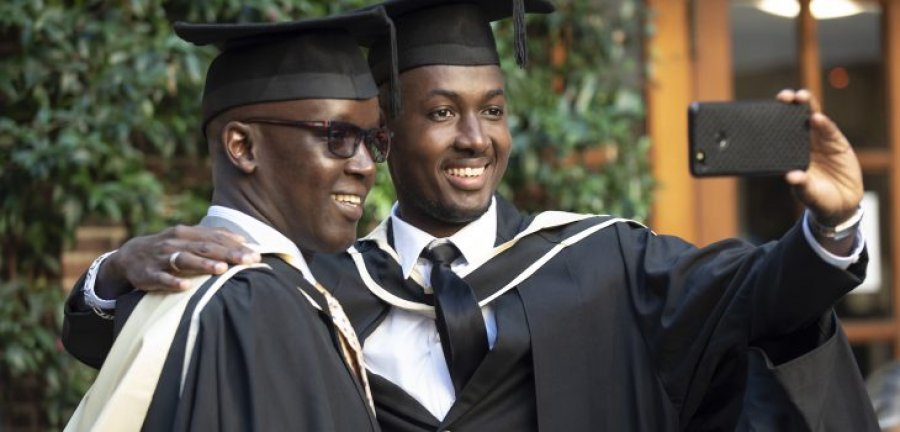Study Clinical Trials online - Ayub and Moses' story
15 April 2019 London School of Hygiene & Tropical Medicine London School of Hygiene & Tropical Medicine https://lshtm.ac.uk/themes/custom/lshtm/images/lshtm-logo-black.png
How does it feel to be a graduate of LSHTM?
AM: I am very excited and very happy. It has been a long journey and I’m very happy it’s finally done.
MW: I have been looking forward to this day. I know I had the option to [complete the MSc] in five years but I wanted to push myself and do it in three years, so I am very excited and happy about myself having achieved it.
Looking back, why did you want to study Clinical Trials?
AM: After graduating from clinical medicine class I had a year of internship in a district hospital where clinical research was carried out hand-in-hand with offering general care – that’s where I developed an interest. My first job post internship was as a clinician for a clinical trial and later my roles evolved to safety officer, trial coordinator and trial manager. I felt that enrolling for the MSc would allow me to learn a lot more and enhance my skill set.
MW: I had worked in clinical trials for the last 14 years in different capacities and had gathered a lot of experience in operational aspects of clinical trials, but realised I needed to take it to the next level, and the MSc Clinical Trials was the master key!
Following completion of the programme, I was promoted to clinical trials manager
And why did you choose to study with LSHTM?
AM: First and foremost the reputation of the School. I have read different papers published from people working within the School, know of others who have had collaborations with the School and I have some friends who have studied the programme before.
MW: It’s a prestigious college, the name is out there and every time someone hears you’re studying at LSHTM, they’re excited and it’s “thumbs up” because it’s known out there. So it was very easy to make that decision.
Moses (L) and Ayub (R) celebrate their graduation day.
What skills did you gain from studying the programme?
AM: A lot! First I learned about self-directed learning which I think is vital especially as I would like to enrol for a research degree. And in terms of course material: project planning, budgeting, risk management and managing the project life cycle are some of the important skills I gained.
MW: The list is endless, but I’ll restrain myself to project management as key, as well as protocol development. At the time I took the Protocol Development module, I was writing a protocol for a study, so the module was very timely!
What were you doing alongside your studies? And how will the programme help in your career?
AM: I was employed full-time as a trial coordinator and trial manager throughout the programme duration. The programme has helped me become better at my job and has given me more confidence when dealing with challenging situations. It has made me even more ambitious to pursue other interests and importantly believing I can take on more responsibilities.
MW: I was working as clinical trial coordinator for a multi-centre (15 sites), multi-country (3 countries) clinical trial and was preparing for a new study (protocol development, documents…). It was hectic! Following completion of the programme, I was promoted to clinical trials manager.
I think it’s good value for money and it’s a good education that gives you a lot of confidence
How did you find studying by distance learning?
AM: I’ll be honest and say at the beginning I was apprehensive, as I’m used to sitting in a class and taking instructions from a teacher. But I’d say with the support we have had from the tutors, the Collaborate [webinar] sessions and having the chance to ask questions on Moodle [virtual learning environment] – it beat my expectations.
MW: I feel it was quite engaging and the teaching staff are supportive. You don’t feel the distance per se because if you’re stuck with something, you’re just an email away and you get a response very quickly. And the online library is just amazing! Of course there were a few challenges – the fact you have a family, you have a full time job and you have to catch up with your study. It required a lot of adjustment and being organised, setting timelines and sticking to them, but we pulled through.
Would you recommend studying Clinical Trials by distance learning to others?
AM: Yes I would. I recommended it to a colleague who has started the programme, and have another colleague who has received a letter offering admission. I think other friends and colleagues of mine who work as study coordinators, project managers, research nurses or research clinicians would benefit from the programme and I will certainly recommend it to those who haven’t already. I think it’s good value for money and it’s a good education that gives you a lot of confidence. I am feeling very confident and proud right now as an LSHTM graduate. I feel I can take on the world!
MW: Absolutely! This programme is appropriate for anyone working in clinical trials or desiring a deeper understanding of clinical trials. I have actually already recommended the programme to a number of my colleagues and friends.
How would you sum up your experience studying by distance learning?
AM: It was fun, it was very informative and there’s lots of people I would advise to try it.
MW: That would take a whole month to describe! But I think the experience was really good.
